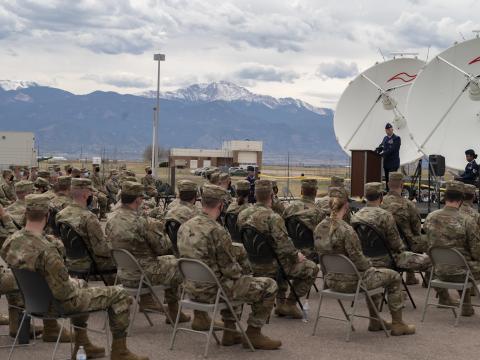DID SECRETARY GATES FEEL A DRAFT AT WEST POINT?
There is no shortage of topics to engage with you on starting with the continuing events in Libya and whether Colonel Gaddafhi will go into exile, die at his post as he claims he is ready to do, or prevail. In the meantime violence engulfs the country and has driven oil prices to over $100 a barrel. Then there is the drama and trauma of the US Government being at least partially shut down because of the inability of the White House and both houses of the Congress to come together on spending cuts so an appropriations bill can be passed to fund government operations for the rest of FY 11. Does anybody believe it prudent to fund a $3 trillion a year enterprise in two week increments??!?! Alternatively there is the “ROLLING STONE” article about the use of a pysch ops unit to prepare for Congressional Delegation (CODEL) visit to Afghanistan. The DNI’s recent response to Senate Armed Service Committee interlocutors that China and Russia vice North Korea or Iran are the nation states presenting the gravest danger to the United States is certainly worthy of debate on several levels. All of these topics, however, pale in strategic significance (to me at least) to Defense Secretary Gates’ recommendations that the United States not commit ground combat forces to Asia in the future. The SecDef’s surprising policy advice to the Corps of Cadets at West Point on 25 February (http://www.defense.gov/speeches/speech.aspx?speechid=1539 ) also seems to endorse the central premise of Bing West’s latest book: THE WRONG WAR: Grit, Strategy, and the Way out of Afghanistan (http://www.westwrite.com/books/).
In eight pages of text, the Secretary discusses three topics:
- The future of conflict, and the implications for the Army;
- How best to institutionalize the diverse capabilities that will be required; and
- The kinds of officers the Army will need for the 21st Century, and how the service must change to retain and empower those leaders.
The following three lines have drawn all the attention and will be long remembered:
“But in my opinion, any future defense secretary who advises the president to again send a big American land army into Asia or into the Middle East or Africa should “have his head examined,” as General MacArthur so delicately put it.”
With a record of 1 (Kuwait/win), 1(Vietnam/loss), 1 (Korea/tie),and 2 (Iraq and Afghanistan/incomplete) there is demonstrable evidence that fighting with ground forces in Asia and the Middle East has not turned out well for the United States and taken a heavy toll in each instance on the combat readiness of Army and Marine combat units. The reasons for success in Desert Storm --- clear threat to US national interests (Saddam’s threat to Saudi oil fields), allied and regional support (operating bases), and a clear military objective (ejection of Iraqi forces from Kuwait) --- make Gates’ point because it seems extremely unlikely we will see these conditions again.
A pragmatic foundation to Secretary Gates’ warning about committing a large land force is where the one million or so soldiers and marines the US has available could make a difference on the Asia or Middle East land mass. Certainly not in China, Iran, or Pakistan given their geographic and demographic size, their considerable military power, and their distance from the United States. Korea? Been there done that! Israel is the only place that gives me pause, but as in the past I see US air, naval, and logistical power being of more use to the defense of Israel then the commitment of ground combat forces.
More importantly, Secretary Gates’ is operationalizing his advice about committing ground forces Asia and the Middle East in the FY 12 budget where he is recommending a reset in defense capabilities by increasing investment in air and naval forces to dissuade and deter countries like China, Iran, or North Korea from acting against US national interests. I don’t think it is lost on Secretary Gates that when the US became a global military power under President Teddy Roosevelt it was with naval power and not a large standing army – because we did not have or want one. Are there intelligence implications for such a shift in national defense policy – of course, there are but they seem trivial to larger questions being raised by the SecDef.
Referring to General McArthur, Secretary Gates understands he is not the first senior defense official to warn against the use of ground forces in Asia or the Middle East. Recall the Powell Doctrine tenets from the former Chairman of the Joint Chiefs of Staff and Secretary of State announced in 1990:
- Is a vital national security interest threatened?
- Do we have a clear attainable objective?
- Have the risks and costs been fully and frankly analyzed?
- Have all other non-violent policy means been fully exhausted?
- Is there a plausible exit strategy to avoid endless entanglement?
- Have the consequences of our action been fully considered?
- Is the action supported by the American people?
- Do we have genuine broad international support?
In many ways the Powell Doctrine was a restatement of the Weinberger Doctrine developed to keep the United States out of future Vietnam-like quagmires. On November 28, 1984 then Secretary of Defense told the nation the following principles should guide the commitment of US combat forces in the future.
- The United States should not commit forces to combat unless the vital national interests of the United States or its allies are involved.
- U.S. troops should only be committed wholeheartedly and with the clear intention of winning. Otherwise, troops should not be committed.
- U.S. combat troops should be committed only with clearly defined political and military objectives and with the capacity to accomplish those objectives.
- The relationship between the objectives and the size and composition of the forces committed should be continually reassessed and adjusted if necessary.
- U.S. troops should not be committed to battle without a "reasonable assurance" of the support of U.S. public opinion and Congress.
- The commitment of U.S. troops should be considered only as a last resort.
The wisdom of Weinberger and Powell apparently became “old think” though with the demise of the Soviet Union and overwhelming success of US Forces on the ground in Desert Storm and later in Iraqi Freedom. Then came the realities of post combat Iraq and the open-ended commitment to Afghanistan where West Bing tells us the limited successes we are having shows we don’t have sufficient numbers to replicate them on a wider scale.
Let us tread lightly here though, because we are now approaching the question of whether an all volunteer force can muster the numbers to be effective in Asia with its large landmass and population base along with its importance to the US economy. I believe Secretary Gates is adroitly pushing civilian and uniformed defense leaders to consider the limits of American military power given the resources allocated to it along with what the American people are willing to sacrifice for in terms of national interests. If a vital national interest is at stake in Asia or the Middle East (not an ephemeral threat) that demands troops on the ground, shouldn’t that be a call to national mobilization? After reminding all of General McArthur’s experience based warning, I believe Weinberger, Powell, and Gates would all answer in the affirmative
That’s what I think; what do you?



